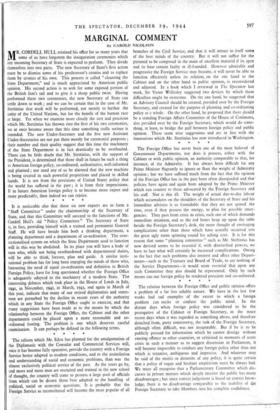The Foreign Office has never been one of the most
beloved of Government Departments, nor does it possess, either with the Cabinet or with public opinion, an authority comparable to that, for instance, of the Admiralty. It has always been difficult for any Prime Minister flagrantly to ignore or flout the weight of Admiralty opinion ; but we have suffered much from the fact that the opinion of the Foreign Office has in the past been often disregarded and that' policies have again and again been adopted by the Prime Minister which run counter to those advocated by the Foreign Secretary and his staff. Nor is this ill. The weight of actual day-to-day labour which accumulates on the shoulders of the Secretary of State and his immediate advisers is so formidable that they are not spared the time, even if they possess the energy, to plan for possible emer- gencies. They pass from crisis to crisis, each one of which demands immediate attention, and as the red boxes heap up upon the table beside the Foreign Secretary's desk, the mere thought of envisaging complications other than those which have actually occurred sets the great ugly room spinning round his aching eyes. It is for this reason that some "planning committee" such as Mr. Steftinius has now devised seems to be essential if, with diminished powers, we have to face what will certainly be increased complications. Owing to the fact that such problems also interest and affect other Depart-. ments—such as the Treasury and Board of Trade, to say nothing of the Service Departments—it would seem essential that upon any such Committee they also should be represented. Only by such means can our foreign policy be rendered prescient and co-ordinated.


























 Previous page
Previous page